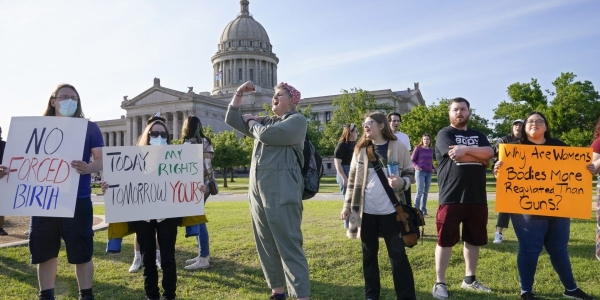
A divided Oklahoma Supreme Court on Tuesday overturned a portion of the state’s near total ban on abortion, ruling women have a right to abortion when pregnancy risks their health, not just in a medical emergency.
It was a narrow win for abortion rights advocates since the U.S. Supreme Court struck down the landmark Roe v. Wade last year. Since then, conservative states including Oklahoma have enforced restrictions on abortion.
Oklahoma’s top court ruled that a woman has the right under the state Constitution to receive an abortion to preserve her life if her doctor determines that continuing the pregnancy would endanger it due to a condition she has or is likely to develop during the pregnancy. Previously, the right to an abortion could only take place in the case of medical emergency.
“Requiring one to wait until there is a medical emergency would further endanger the life of the pregnant woman and does not serve a compelling state interest,” the ruling states.
In the 5-4 ruling, the court said the state law uses both the words “preserve” and “save” the mother’s life as an exception to the abortion ban.
“The language ‘except to save the life of a pregnant woman in a medical emergency’ is much different from ‘preserve her life,’” according to the ruling.
“Absolute certainty,” by the physician that the mother’s life could be endangered, “is not required, however, mere possibility or speculation is insufficient” to determine that an abortion is needed to preserve the woman’s life, according to the ruling.
The court, however, declined to rule on whether the state Constitution grants the right to an abortion for other reasons.
The court ruled in the lawsuit filed by Planned Parenthood, Tulsa Women’s Reproductive Clinic and others challenging the state laws passed after the U.S. Supreme Court overturned the Roe v. Wade, which had guaranteed a nationwide right to abortion for nearly half a century.
Since then, a patchwork of laws has meant some patients have had to travel to other states to get abortions when it was outlawed where they lived.
“This ruling leaves out too many Oklahomans. Oklahomans shouldn’t have to travel across state lines just to reach an abortion clinic, and it is heartbreaking that many will not be able to do so,” said Dr. Alan Braid, an abortion provider and plaintiff in the case said in a statement.
The ruling in Oklahoma is unlikely to mean abortion becomes widely available.
In a lawsuit filed earlier this month over Texas’ abortion ban, five women said they were denied abortions even when pregnancy endangered their lives. The suit claims the Texas law is creating confusion among doctors, who are turning away some pregnant women experiencing health complications because they fear repercussions.
Emily Wales, president and CEO of Planned Parenthood of Great Plains called the ruling a small step toward restoring the right to abortion.
“The Oklahoma Supreme Court recognized one fundamental truth: patients must be permitted to access critical care to save their lives,” she said. “But the right recognized today is so limited that most people who need abortion will not be able to access it.”





